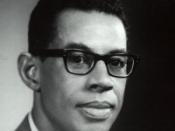It is always interesting when people do not know what my race is. Usually people use conversation and indirect questions to get clues. For instance, they might ask where I was raised in order to get a clue if I was from a particular county or region, or perhaps to catch an accent. Other times they may make a certain comment to hoe I react. Quite often people will just plain ask me "what are you?" It is an interesting question. I could answer this a number of different ways. I could say I am a man, a father, a husband, an American, a paralegal, a jerk, a student or any number of replies that do not give the answer they are looking for. The "what" in their question is invariably referring to my ethnic background. The reason they are asking is that people have preconceived notions of different ethnic groups and if they cannot place you in a specific group, they cannot get a feel of who you are.
I know my employers have judged me the same way others do, and it has affected my employment status, both directly and indirectly. These preconceived notions are the basis for many racial issues and to think that these notions become insignificant in the workplace would be foolish. Racial discrimination in the workplace exists. The challenge is proving it exists and making a change.
Federal law makes in unlawful for an employer to fail or refuse to hire, to discharge an individual or to discriminate in any way with respect to his compensation, terms, conditions or privileges of employment based on race (Bennett-Alexander & Hartman, p.179, 2001). Additionally, statute 42 U.S.C. 2000-2(a) declares an employer may not limit, segregate or classify employees or applicants in any way which would deprive or...


